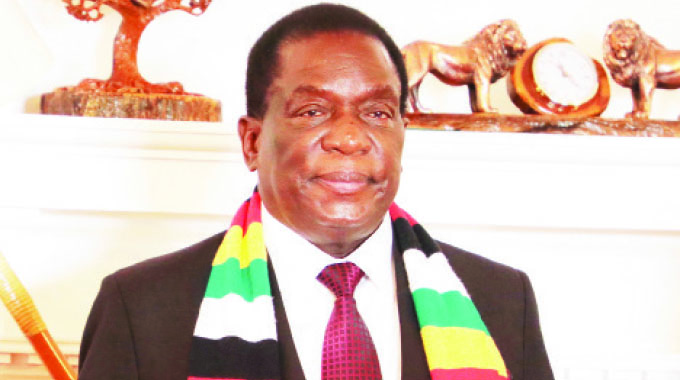President proud of industry revival

Prosper Ndlovu Bulawayo Bureau
PRESIDENT Mnangagwa yesterday expressed pride over the positive strides being registered by the country’s industries — taking advantage of the supportive Government policy reforms.
These have enhanced domestic output at a time when the global economy is being battered by the deadly Covid-19 pandemic.
The country’s manufacturing sector capacity utilisation is expected to clock about 61 percent by the end of this year from 54 percent registered in the second quarter, according to the Confederation of Zimbabwe Industries (CZI).
This is a milestone achievement considering that industry capacity closed 2020 at 47 percent, having risen from 36 percent in 2019.
The jump in productivity has been attributed to spiking demand, macro-economic stability, fiscal incentives and improved access to foreign currency through formal channels, among other policy enhancement measures.
Local businesses have responded positively by adopting the Local Content Strategy, aimed at building adequate domestic value chains and substituting imports, said President Mnangagwa who was in Bulawayo to officially open the Zimbabwe International Trade Fair (ZITF) 61st Edition.
While the prime trade expo was cancelled last year due to Covid-19, the President said he was impressed by the diverse and high quality of goods and services showcased at this year’s ZITF, especially considering the fact that local produce is now dominating both shelf space in retail outlets, as well as exhibition space.
“The private sector has made sure they perform extremely well so that we never again stop them from holding this exhibition.
The quality of products and arrangements, you wonder whether we are in Zimbabwe under sanctions,” said President Mnangagwa immediately after finishing his tour of stands at around 12pm.
“It’s really amazing that we’re achieving what we have achieved under the conditions we are in. I’m proud of our people in the private sector. You deserve due commendation.”
The revival of the private sector buttresses the ideals of the National Development Strategy (NDS1:2021-2025), a key building block towards realisation of Vision 2030.
Improved output also positioned Zimbabwe towards fulfilling the African Union Agenda 2063 and United Nations Sustainable Development Goals for improved livelihoods.
Later in his official opening speech, President Mnangagwa told delegates, who included Vice President Dr Constantino Chiwenga, Cabinet ministers, diplomats and industry executives, that Zimbabwe was making huge strides in transforming its economy.
With a Gross Domestic Product (GDP) growth projection of 7,8 percent this year, up from the initial 7,4 percent, the President said Zimbabwe has become “one of the fastest growing economies” in the region as well as one of the fastest movers on the World Bank Doing Business Index.
“These success milestones demonstrate the convergence of the positive national sentiments and unity of purpose between the private sector, Government and all the people of our great country,” he said.
“This also serves as a testimony of the confidence stakeholders have in Zimbabwe’s economy. The demonstration of solidarity and cooperation must be consolidated . . . The Second Republic will continue to guarantee a predictable policy environment where capital feels safe.”
President Mnangagwa said the on-going economic reform agenda was not only making Zimbabwe a favourable investment destination but has scored successes in containing inflation and realisation of budget surplus, as opposed to deficits as was the case in the past years.
He said the country’s foreign earnings, which have reached over US$5 billion so far this year, were evidence of an economy on a growth trajectory despite the adverse impact of the pandemic.
Going forward, the President said efforts to transform the economy from an exporter of predominantly primary products to higher nodes of high value industrial production would be intensified.
He directed Government agencies and departments to play their part and support the country’s industrial revolution. In doing so, Zimbabwe is alive to the digitalisation imperative, which demands that local industries adopt smarter, sustainable and digitally enabled manufacturing and supply chain models.
To this end, President Mnangagwa has challenged the private sector to create synergies and collaborations with start-ups at the country’s institutions of higher learning.
He also implored the small to medium enterprises to take advantage of the simplification of the tax regime to enhance discipline and good corporate citizenship within the sector.
In line with the Government’s engagement and re-engagement drive, the President said it was critical to attract more investments and grow exports by penetrating global markets as a building block towards opening the economy.
He commended the ZITF Company for introducing the inaugural Diplomats Forum to complement Government policy on economic diplomacy and growing exports.
Similarly, the President highlighted the intricate link between trade and integration and encouraged local businesses to embrace the African Continental Free Trade Area (AfCFTA) so as to widen their export markets.
“On its part, my Government is building robust, digitally enabled economic infrastructure that empowers the citizenry to access opportunities under this single market,” he said.
This year’s ZITF Expo runs under the theme: “Showcasing the New Normal for Business and Industry: Realities and Opportunities”, and reflects the country’s growing focus to re-invigorate business and industry in achieving more and inclusive growth.
In that regard, President Mnangagwa said the advent of Covid-19 has necessitated the need to reconfigure economies through innovation and building resilience.
He reiterated Government’s focus on modernising critical public infrastructure such as roads, airports, irrigation and public health facilities as enablers to robust growth and attracting investment across the country. This drive is being pursued within the context of the Devolution and Decentralisation Agenda, which will also benefit businesses in various provinces and districts, leveraging on the diverse comparative advantages and endowments.
President Mnangagwa also stressed the importance of a stable energy and power sector and assured the country that on-going new project implementation would yield positive results while efforts were underway to harness the vast renewable energy potential.







Comments